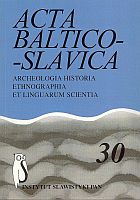Московская лингвистическая школа и традиции современной балтистики
The Moscow Linguistic School and Tradition of Modern Baltic Linguistics
Author(s): Oleg PoljakovSubject(s): Language and Literature Studies
Published by: Instytut Slawistyki Polskiej Akademii Nauk
Keywords: Moscow linguistic school; F. F. Fortunatov; Baltic linguistics; extralinguistic factors; ethical principles in academic activities
Summary/Abstract: The global political and economic changes over the past 15 years have had negative consequences on the development of many academic sciences. Linguistics, like many other humanities disciplines, faces many problems in the changed world and tries to accommodate itself to the realities of today. Solving the existing problems seems to be impossible without taking into consideration the experience gained by many linguistic schools. In this connection the experience of the Moscow linguistic school is one of the most valuable. The linguistic science here flourished under different political regimes and in different economic situations. This linguistic school was created by Filip Fedorovich Fortunatov (1848-1914). Its appearance and development in many aspects is connected with the appearance and development of Baltic linguistics. The article briefly reviews the contribution made by F. F. Fortunatov and his school to different aspects of Baltic linguistics. The analysis of their works shows that many scientific principles of this school have been elaborated and formulated on the ground of investigations into, primarily, Baltic languages, especially Lithuanian. Another reason for the success of this school can be connected with its interdisciplinary activities and some extralinguistic factors. F. F. Fortunatov and his fellows were able to create a flourishing atmosphere of investigations aimed at cooperation with different scholars irrespective of their nationality, religion, and personal convictions. The Moscow linguistic school is also famous for introducing ethical principles into academic activities. In this connection the further study of its different and unique experience seems to be especially important at the present time
Journal: Acta Baltico Slavica
- Issue Year: 2006
- Issue No: 30
- Page Range: 107-123
- Page Count: 17
- Language: Russian

